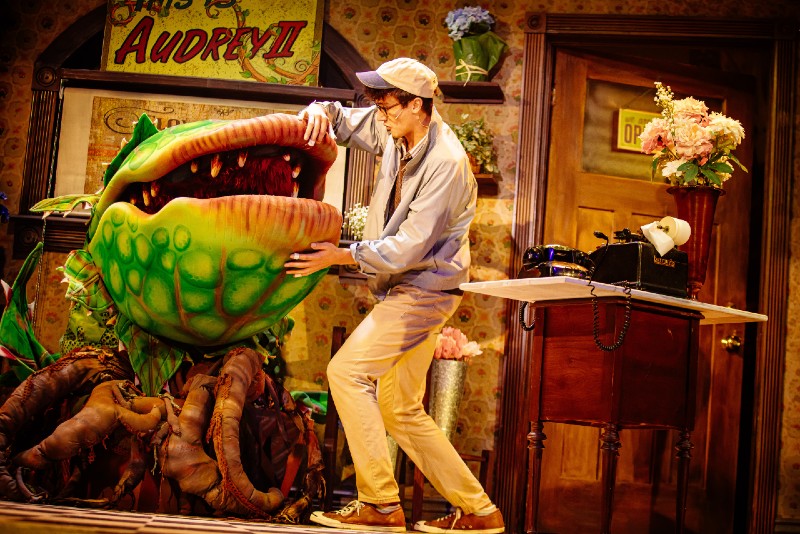Friday Five: Martes Martes, Tanager, Benji Robot, The Missing Cats, Totalitarians

Friday Five highlights music by Washtenaw County-associated artists and labels.
This week features quirky sounds by Martes Martes, indie pop by Tanager, downtempo electronica by Benji Robot, fusion-jazz pop by The Missing Cats, and pure noise by Totalitarians.
Everyday Talismans: Amy Sacksteder's new Ann Arbor Art Center Exhibit is a collage of colors

Amy Sacksteder explores life through collage art in a new exhibit at the Ann Arbor Art Center.
Talismanic: The Collected Collages of Amy Sacksteder, on display through October 7, features four different series that she completed over eight years: Generations (2015), Grounded/Ungrounded (2019), Time Ghosts (2019-2020), and Echo Keepers (2021).
While the collages tend toward abstraction, the images are inspired by scenes and items in Sacksteder’s life, whether it's the natural beauty surrounding her house or the various common objects that reside within it. The cumulative effect of the Talismanic collection gives viewers the impression they are seeing snapshots from a personal photo album.
Spirit Animal: Theatre Nova’s “Mlima’s Tale" explores the costs of human greed

At the start of Theatre Nova’s production of Lynn Nottage’s Mlima’s Tale, the four-person cast enters in a line, stomping and breathing deeply in unison, mimicking the movements of an elephant.
For that’s what Mlima is.
The old Kenyan “big tusker,” named after the Swahili word for “mountain,” lumbers onto the stage, at which point actor Mike Sandusky (who stands in for Mlima’s tusks, and spirit, through the rest of the play) speaks: of listening to the winds, and the love he feels for his mate, his family.
But it’s not long before Mlima—despite living within a preserve in Kenya—is felled by a poacher’s poison arrow. The animal’s enormous tusks simply garner too much money in the underground ivory trade to be resisted.
Yet getting that money, because poaching is illegal, is a fraught process, so Mlima’s physical death is followed by a fairly predictable chain of interactions between corrupt authorities, smugglers, ship captains, shady art-world dealers and creators, and rich collectors who can’t be bothered with origin stories of “how the ivory gets made,” so to speak.
Previous critics have noted that a point of inspiration for Mlima’s Tale, which premiered in New York in 2018, is Arthur Schnitzler’s La Ronde, which chronicles a linked series of sexual encounters across class boundaries. In Nottage’s piece, we follow the tusks, personified by the ever-looming Sandusky, as they change hands and enrich each person who briefly possesses them.
History From the Margins: UMS is bringing Druid Theatre's productions of Sean O’Casey’s "Dublin Trilogy" to the Power Center

“The whole world’s in a terrible state of chassis!”
—Captain Boyle
Juno and the Paycock
In 1916 a large part of the world was in chaos and crisis. World War I was tearing Europe apart, and in Ireland, the leaders of anti-British forces saw an opportunity to rise against a pre-occupied British government and attempt to finally drive the British government from Ireland.
The deadly events of what is remembered as the Easter Rising were the beginning of a violent eight-year period that would in time free Ireland from British rule but at a high cost. Following the Rising, a war of independence began, ending with a treaty to give Ireland Free State status while still bonded to Britain. That treaty led to a civil war pitting defenders of the treaty against those who believed the treaty was a betrayal.
Playwright Sean O’Casey grew up in the tenements of Dublin. He was a self-taught reader, a laborer, a railway worker, and eventually, a writer with a keen ear for the language of his native city. In the 1920s, he created three plays that covered the period from the Easter Rising to the Civil War. Each play centers on the lives of tenement dwellers in the Irish capital who become caught up in the frenzy and frustration of the long-running domestic war. O’Casey’s plays are both comic and tragic as well as deeply humane.
The University Musical Society (UMS) is presenting the Druid Theatre’s production of O’Casey’s Dublin Trilogy, under the direction of Druid founder and artistic director Garry Hynes, October 18-21. The Galway-based theater company is bringing the play to New York City and Ann Arbor only.
Hynes was artistic director for Druid Theatre from 1975 to 1991 and again from 1995 to the present. From 1991 to 1994, she was the artistic director of the famed Abbey Theatre, where many of O’Casey’s plays premiered.
In a telephone interview, Hynes said O’Casey’s trilogy is about the working people of Dublin living in the tenements.
Monday Mix: MEMCO and Immaculate Conception dance sets, Indie Pop Takeout radio shows

Every week since September 11, 2020, we've published the Friday Five to highlight local music. By my abacus, that's more than 150 columns spotlighting nearly 800 music projects—singles, EPs, albums, and videos—by Washtenaw County-associated artists and labels.
Dance mixes by student DJs at the (University of) Michigan Electronic Music Collective (MEMCO) are featured frequently on Friday Five, as are those by Immaculate Conception, a group comprised of MEMCO grads that promotes works by women and gender-nonconforming people.
With MEMCO and Immaculate Conception cranking out mixes almost weekly, it made sense to highlight these DJ sets alongside various other Washtenaw County music-based podcasts and radio shows in an occasional column: Monday Mix.
For our first round, here are five recent dance mixes by MEMCO and Immaculate Conception members along with recent episodes of the weekly internet radio program Indie Pop Takeout.
Friday Five: Milan Seth, Skyline, Jah Sun / WhereIsJah, Nancy Zeltsman, Eve Machines

Friday Five highlights music by Washtenaw County-associated artists and labels.
This week features Americana by Milan Seth, downtempo jams by Skyline, hip-hop productions by Jah Sun / WhereIsJah, marimba music by Nancy Zeltsman, and rocktronica by Eve Machines.
Sobering Thought: Erin Zindle & The Ragbirds Remember a Late Friend’s Determination to Overcome Alcoholism on “Liquor Store” Single

Erin Zindle & The Ragbirds remember a late friend’s strength and determination to overcome alcoholism on “Liquor Store.”
The bluesy new single from the Ann Arbor folk-rock band addresses the daily struggle Nelson Whitehorse faced while trying to fight addiction and follow a path to recovery.
“He was from St. Louis actually and moved to Ann Arbor to be in a band with me, and we lived together for a year,” said Zindle about Whitehorse, who passed away several years ago. “We lived on the west side of Ann Arbor and he had been an alcoholic since childhood.”
Throughout “Liquor Store,” Erin Zindle and bandmates TJ Zindle (electric and acoustic guitar, vocals), Loren Kranz (drums, vocals), and Shannon Wade (bass, vocals) chronicle Whitehorse’s ongoing challenge of having to walk past a liquor store each day to visit the local Alano Club.
Ominous keys and drums follow Zindle as she sings, “You said ‘Grace is new every morning’ / As you stared into your black coffee cup / Today you’re gonna make it past the liquor store / To get to the Alano Club.”
“I saw that battle play out over and over every day, and sometimes he made it, and sometimes he didn’t,” she said. “The daily work is just getting there every day.”
The band opted to release “Liquor Store” on September 14, which coincides with National Sober Day, to celebrate sobriety and raise awareness about addiction.
The track also helps Whitehorse’s family and friends to take comfort in his memory as a “hilarious, loyal, giant-hearted friend” as Zindle noted in a Ragbirds’ Facebook post.
“The message I hope people will take away is that today you’re going to make it,” Zindle said. “It literally is just that one day at a time. I’m so grateful that the song came to me, and it came with that wisdom to know not to add any message to it.”
We recently spoke to Zindle about the band’s new single, its strategy for releasing new songs and an upcoming album, the inspiration behind several tracks, the creative process for writing and recording them, a Halloween show at The Ark, and additional plans for new material.
Dress for Success: Costume designer Suzanne Young clothes actors for local, national, and international theater productions

It was 1981 when Suzanne Young, 21, moved to Boston from her native England.
“It was a bit of a culture shock,” she recalls. “Police came to the costume rental shop for Santa costumes. I wasn’t used to seeing people with guns on their hips or to hearing people tell me how much they loved my accent.”
She’s gotten used to this side of the pond, settling with her husband, Larry, in Dixboro, a village just outside Ann Arbor, and became a go-to costume designer for area theaters including the University of Michigan, Purple Rose, Wild Swan, Performance Network, and more.
The Youngs found their way here circuitously, with time spent in Europe and different states. But wherever they went, Suzanne created opportunities to work—from opening a school to teach English to French children to developing a wedding gown company.
Friday Five: James P. Johnson & U-M Opera Theatre, Couch, Dagoretti Records compilation, Same Eyes, Darrin James

Friday Five highlights music by Washtenaw County-associated artists and labels.
This week features a James P. Johnson blues-opera recording by the University of Michigan Opera Theatre, noise rock by Couch, a Dagoretti Records comp of Kenyan music, synth-pop by Same Eyes, and Americana by Darrin James.
Insatiable Appetite: Encore Theatre serves up a delicious “Little Shop of Horrors”

Feed me!
The Encore Musical Theatre Company is serving up a feast of fun, a musical time trip to 1960, and a charming story about an odd plant who develops a taste for human blood.
Little Shop of Horrors is not your typical musical, and it wasn’t your typical horror movie when B-movie master Roger Corman directed the screwball movie that inspired a hilarious and oddly lovable musical.
Little Shop of Horrors opened off-Broadway in 1982, with book and lyrics by Howard Ashman and music by Alan Menken while Ashman also directed. The team went on to help rescue Disney animation with hit songs for The Little Mermaid, Beauty and Beast, and Aladdin. Little Shop won raves off-Broadway and moved to Broadway for more acclaim. That led to another movie, the musical version.
The setting is 1960. A nebbish named Seymour Krelborn is laboring under slave conditions at Mushnick’s Florist at starvation wages and few prospects. He is hopelessly in love with Audrey, who also works at Mushnick’s, and is beginning to feel something for sweet, kind Seymour. But she’s currently going with a sadistic biker/dentist, a deadly combo.


































